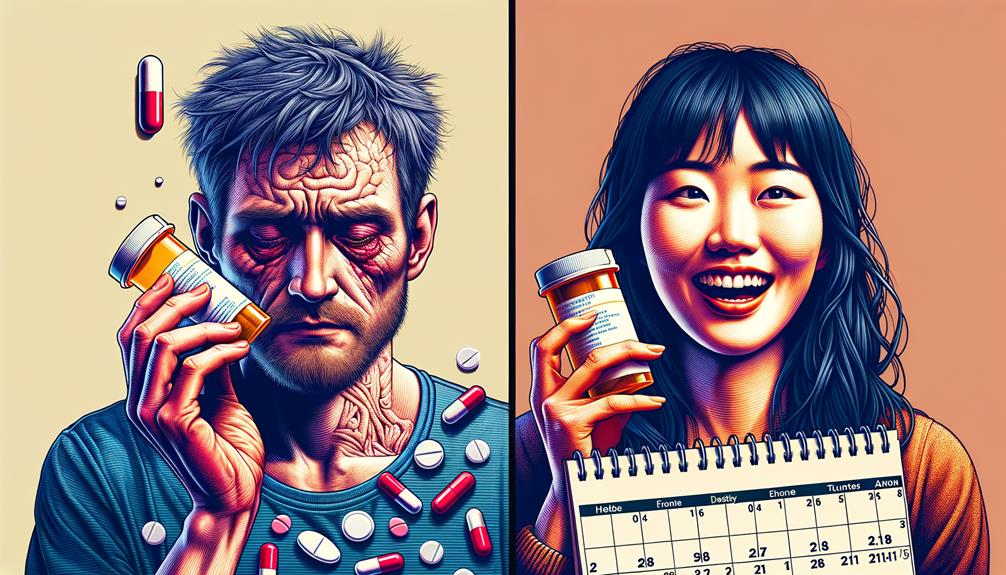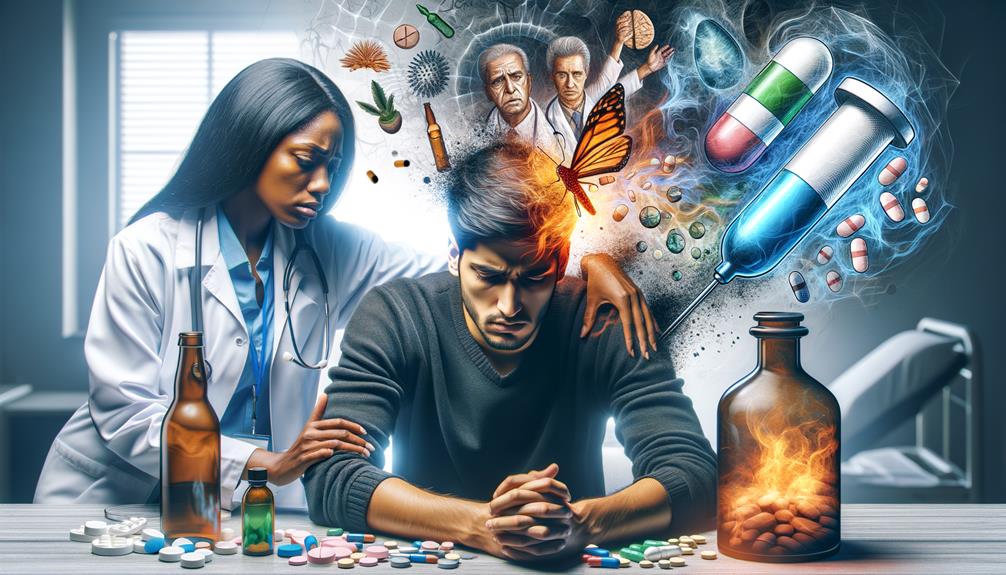Ever wondered how drug detox differs between stimulants and depressants?
The process of detoxification can vary significantly based on the type of substance involved.
From the intense withdrawal symptoms of stimulants to the unique challenges presented by depressants, understanding these distinctions is crucial for effective treatment.
By exploring the nuances of managing stimulant detox and coping with depressant withdrawal, you'll gain insight into the complexities of addressing substance use disorders.
Dual diagnosis considerations further complicate the picture, highlighting the importance of a comprehensive approach to drug detox.
Stimulants Withdrawal Symptoms

If you're experiencing stimulants withdrawal symptoms, remember that seeking support is crucial for your well-being. Physical discomfort such as headaches, fatigue, and changes in appetite are common during this time. Your body is adjusting to the absence of stimulants, which can lead to these temporary challenges.
Alongside physical symptoms, emotional instability may arise. You might feel irritable, anxious, or even depressed as your brain chemistry rebalances. It's vital to understand that these feelings are a natural part of the withdrawal process.
Depressants Withdrawal Challenges
Navigating through the challenges of depressants withdrawal can present unique obstacles as your body adjusts to the absence of these substances.
The challenges of depressants withdrawal may include symptoms like anxiety, insomnia, and even seizures in severe cases. It's crucial to seek professional support for depressants withdrawal to ensure your safety and comfort during this process.
Surrounding yourself with a supportive network of friends, family, or a healthcare provider can make a significant difference in managing these challenges. Remember, you aren't alone in this journey, and reaching out for help is a sign of strength.
Stay hydrated, get plenty of rest, and prioritize self-care to navigate through the challenges of depressants withdrawal successfully.
Managing Stimulant Detox

When managing stimulant detox, it's essential to prioritize your well-being and seek professional guidance to navigate this process safely and effectively. Having a support system in place can make a significant difference during this challenging time.
Surround yourself with understanding and caring individuals who can offer encouragement and assistance when needed. Additionally, focusing on developing healthy habits such as regular exercise, proper nutrition, and getting enough rest can aid in your recovery journey.
Engaging in activities that promote overall well-being can help distract from cravings and withdrawal symptoms. Remember, you aren't alone in this process, and seeking help is a sign of strength. Stay committed to your recovery goals, and take it one step at a time.
Coping With Depressant Withdrawal
To cope effectively with depressant withdrawal, prioritize self-care practices that nurture your physical and emotional well-being. During this challenging time, it's crucial to focus on relaxation techniques to ease your symptoms.
Deep breathing exercises, meditation, or gentle yoga can help calm your mind and body. Additionally, seeking supportive therapy can provide you with the guidance and encouragement needed to navigate through this process. Talking to a therapist or counselor can offer you coping strategies and emotional support as you work through withdrawal.
Dual Diagnosis Considerations

Consider exploring the intersection of mental health and substance use when dealing with dual diagnosis considerations. It's crucial to address both aspects simultaneously to ensure a comprehensive treatment approach.
Individuals facing dual diagnosis, where mental health conditions coexist with addiction, require specialized care that integrates mental health support into addiction treatment. By focusing on both mental health and addiction concurrently, you can provide a more effective and holistic recovery path.
Treatment options such as therapy, medication management, and support groups tailored to address mental health concerns alongside addiction issues are essential.
Frequently Asked Questions
What Are Some Common Misconceptions About Drug Detox That People May Have?
When it comes to drug detox, many people hold common misconceptions. Understanding the detox duration, impact on mental health, and the role of natural remedies is crucial. Let's debunk myths to support your journey.
How Long Does the Detox Process Typically Last for Stimulants and Depressants?
Detox duration varies depending on factors like substance, health, and support. For stimulants, detox typically lasts around 7-14 days, while depressants may take 5-10 days. Success rates increase with proper support systems and counseling options.
Are There Any Natural Remedies or Alternative Therapies That Can Help With Drug Detox?
To support drug detox, consider herbal remedies like milk thistle or acupuncture for pain relief. Meditation can calm your mind, and exercise can boost your mood. These natural therapies may aid in your journey to recovery.
What Are Some Strategies for Preventing Relapse After Completing a Detox Program?
After completing a detox program, remember relapse prevention is key. Develop coping skills, lean on support systems, and practice mindfulness techniques. Stay aware of triggers, prioritize self-care, and seek professional help if needed. You've got this!
How Does a Person's Mental Health History Impact Their Experience With Drug Detox and Withdrawal?
Your mental health history significantly influences detox experiences. Dual diagnosis requires specialized treatment. Trauma can intensify withdrawal symptoms. Developing healthy coping mechanisms is vital. Seek professional support to navigate these challenges effectively and ensure a successful recovery journey.
- 20 Day Inpatient Alcohol Rehab - February 15, 2024
- Drug And Alcohol Rehab 77441 - February 15, 2024
- Alcohol Rehab York Pennsylvania - February 15, 2024








